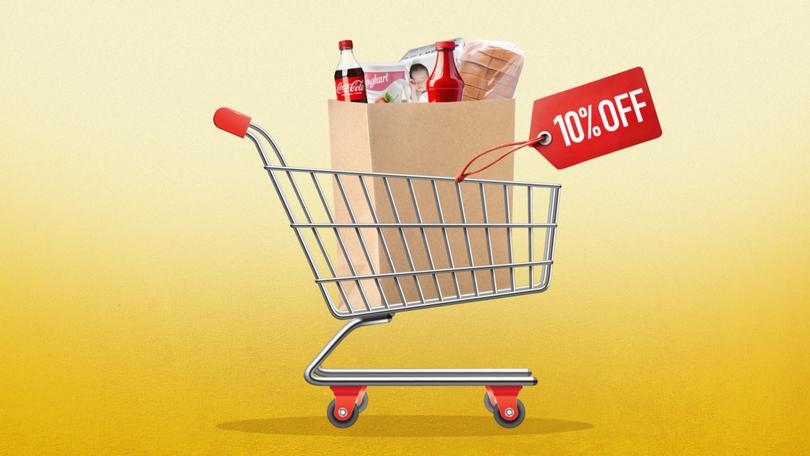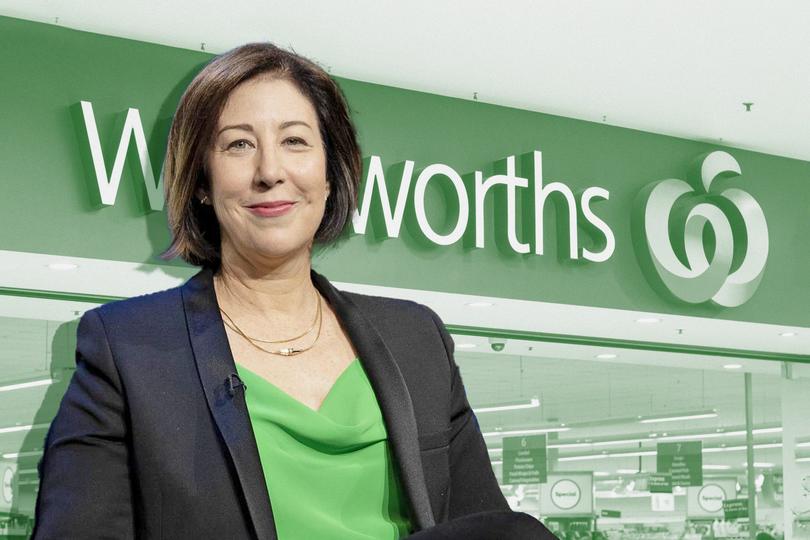Woolworths slashes prices on key products in move to regain market share in Coles, Aldi battle
Woolworths has announced it will slash prices on key products as it moves to regain market dominance, potentially firing the starting gun of a supermarket giant price war.

Is the decision by Woolworths and Coles to cut the price on hundreds of products a sign that the cost-of-living inflation crisis is coming to an end?
On Sunday, Woolworths said it would reduce prices by 10 per cent on almost 400 products. By 4pm Monday, Coles had retaliated by lowering prices on more than 680 products, bringing average savings of 21 per cent.
A price war is certainly one way to ease pressure on household budgets, and news that “basket favourites” including chicken schnitzel, Greek yoghurt, frozen berries and two-litre Coca-Cola at Woolies, and meat, seafood, bakery and frozen items at Coles, will come down in price will be welcome relief.
Sign up to The Nightly's newsletters.
Get the first look at the digital newspaper, curated daily stories and breaking headlines delivered to your inbox.
By continuing you agree to our Terms and Privacy Policy.The move comes as Woolworths attempts to regain momentum after a difficult year marked by a transition from former chief executive Brad Banducci to Amanda Bardwell, previously head of loyalty.
In the earnings call accompanying last week’s trading update, Woolworths chief executive Amanda Bardwell said customers “really resonate” with deep discounts, particularly those greater than 40 per cent.
Announcing the new pricing strategy, Ms Bardwell said the cuts reflected the fact that households were struggling to manage budgets and expected more value from the supermarket.
“Today marks the start of a real, tangible change customers will see on the shelf prices of hundreds of products when they shop with us, both in-store and online. And it’s just the beginning,” Ms Bardwell said.
Woolworths said “hundreds more” products would see lower shelf prices over the coming weeks and months.
“This isn’t just a short-term promotion; it’s about lower shelf prices on the products we know customers regularly shop for, and providing genuine, lasting and dependable value they can count on,” Ms Bardwell said.

Coles acted quickly to ensure Woolworths didn’t dominate media coverage.
“We currently also have over 1000 products at half price, including staple products customers buy most each week containing hundreds of items at half-price from this Wednesday,” the company said.
“We know customers are on the lookout for great value all year round, and... we are continuing to invest in value and will have further savings to announce for the Winter months.”
AMP economist My Bui said the cuts likely reflect a retail landscape in which highly cautious consumers are still struggling with elevated food inflation, particularly meat like lamb, avian flu-affected eggs, and cyclone-impacted fruit.
Ms Bui said the price drops on certain items might offset spikes on fresh produce in the near term, which would be a positive for official inflation figures.
But cost-of-living pressures have not gone away, she said, with retail sales and consumer spending showing zero growth over the last quarter compared to an uptick in late 2024.
“The consumer spending recovery in Australia is still very gradual and fragile and implies that per capita spending went backwards again over the last few months and cost-of-living pressures remain an issue for the average household,” Ms Bui said.
“As a result, business pricing power is still very limited and consumers still need to be enticed with promotions to spend.”
Woolies has been losing market share to a resurgent Coles in terms of sales growth, as revealed in third quarter trading updates by both companies last week.
Coles had also been named as the preferred place to shop for the first time in years, according to an investment bank survey.
That is being reflected on the scoreboard, which has seen Coles’ share price rise 38 per cent in the past 12 months, while Woolworths’ share price is up just 7 per cent.
Both retailers are coming off a 12-month inquiry by the Australian Competition and Consumer Commission into supermarket pricing, which, while benign in terms of recommendations, put the retailers in the crosshairs of the Government and consumers.
The ACCC found Australian supermarkets are highly profitable by international standards and noted Coles and Woolies had increased their average product margins over the last five financial years, particularly for branded goods in household and packaged food categories.
They tended to follow each other’s pricing closely, particularly for staple items, with the ACCC finding that the system of offering half-price promotions was confusing customers and made it difficult for them to assess value.
It noted that an important source of “price restraint” was the presence of German retailer Aldi — a “hard discounter”.
The ACCC recommended making unit pricing clearer and more prominent to help consumers compare prices, alongside establishing a price monitoring function to track grocery prices and margins over time, improving transparency and detecting potential price gouging.
Stephanie Tonkin, CEO of the Consumer Action Law Centre, said with cost of living a key issue during the election, the Albanese Government had a clear mandate to pass consumer reforms.
“We think there is a historic opportunity to introduce relief for cost-of-living pressures in essential services like energy and telcos, urgently implement laws to stamp out the scourge of scams, make lending safer, and address systemic issues in the insurance industry,” Ms Tonkin said.
While the ACCC may have had a reputational impact on the supermarkets, it is more likely that competitive pressure will be the driving force as the retailers go toe to toe in battling for consumers’ wallets.
If deeper discounting results, that could give the Reserve Bank more room for interest rate cuts, which are forecast to go down by 0.25 per cent on 20 May.
“For the RBA I think this serves as a reminder that more rate cuts will be needed to boost household spending as well as the overall economy this year, given that rates are still restrictive and wages are still playing catch up to the changes in prices over the last few years,” Ms Bui said.

